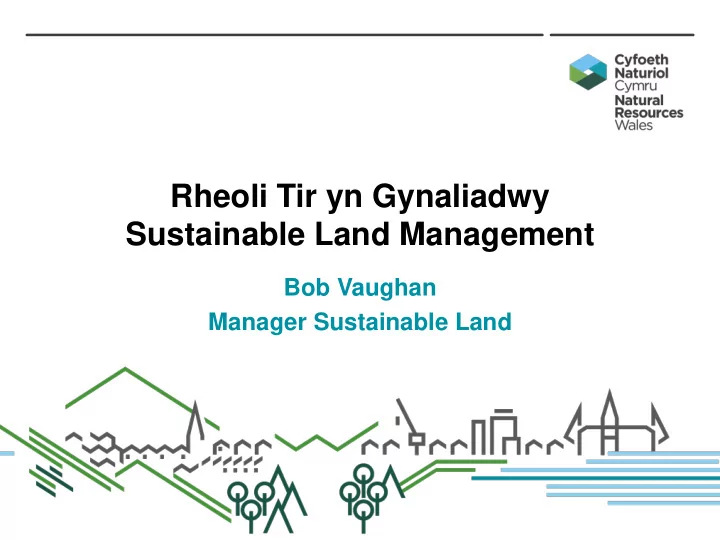

Rheoli Tir yn Gynaliadwy Sustainable Land Management Bob Vaughan Manager Sustainable Land
This Morning • Spell out the Challenges • How the threat of Brexit has also provided opportunities • Look at the new legislation in Wales and how this helps • What does the future look like.
WFD Status
WFD Failures - Diffuse Pollution Wales' Summary of Water Bodies Failing due to Diffuse Pollution , November 2019 120 113 100 No. of water bodies failing for each category 80 62 60 49 40 20 16 16 7 3 0 Abandoned mines and Acidification Agricultural pollution Forestry Sewage discharges Urban & transport Other contaminated land development
Agricultural pollution/Llygredd Amaethyddol
Biodiversity Loss • State of Nature Report Oct 2019 • 1 in 6 species at risk of extinction. • Since the 1970’s of 3902 species: ▪ 73 lost ▪ 666 species threatened with extinction.
Fisheries Loss
Climate Change Emergency • Woodland covers around 15% of Wales (306,000ha) • Climate Change Emergency response: ▪ Creation @ 2000 ha each year to 2030 (0.1% land use change) ▪ Currently below 400 ha a year.
Geographical Vulnerability Wales Sheep Beef Dairy Woodland Abandonment
Well-Being of Future Generations (Wales) Act 2015
Sustainable Management of Natural Resources (SMNR) Environment (Wales) Act NRW’s general purpose - pursue the sustainable management of natural resources : NRW must • Pursue sustainable management of natural resources in relation to Wales, and • Apply the principles of sustainable management of natural resources in the exercise of its functions ,
The 9 Principles of SMNR • Manage adaptively, by planning, monitoring, reviewing and, where appropriate, changing action. • Consider the appropriate spatial scale for action • Promote and engage in collaboration and co-operation • Make appropriate arrangements for public participation in decision-making • Take account of all relevant evidence and gather evidence in respect of uncertainties • Take account of the benefits and intrinsic value of natural resources and ecosystems • Take account of the short, medium and long term consequences of actions; • Take action to prevent significant damage to ecosystems; • Take account of the resilience of ecosystems, in particular the following aspects
Regulatory Principles • Deliver outcomes • Be intelligent • Prepared to challenge • Use the full range of tools available • Be flexible • Bring the right skills / expertise together • Be efficient and effective • Be clear on what we do and why
Setting Regulatory Principles in the context of SMNR • Regulation is more than the application of the law; • Formal regulation (underpinned by the law) can contribute to delivery of sustainable management of natural resources and well- being, but the pressures on our natural environment show this is not the whole solution; • The solution is about doing something – intervening and regulating actions and behaviours, and means doing things and looking at problems differently; • We need to understand the impact of our behaviours, as well as understanding the behaviours of others; and • We need to recognise our limitations and constraints, and value the benefit of collaboration to deliver the wider objectives for Wales – it’s not just about looking at what we, NRW, can do – it is what we, Wales, can do
NRW’s Favoured Approach ▪ Voluntary actions, ▪ Advice, guidance, knowledge, skills & experience development. ▪ Innovation ▪ Regulation ▪ Investment
This Morning • Spell out the Challenges • How the threat of Brexit has also provided opportunities • Look at the new legislation in Wales and how this helps • What does the future look like.
Recommend
More recommend